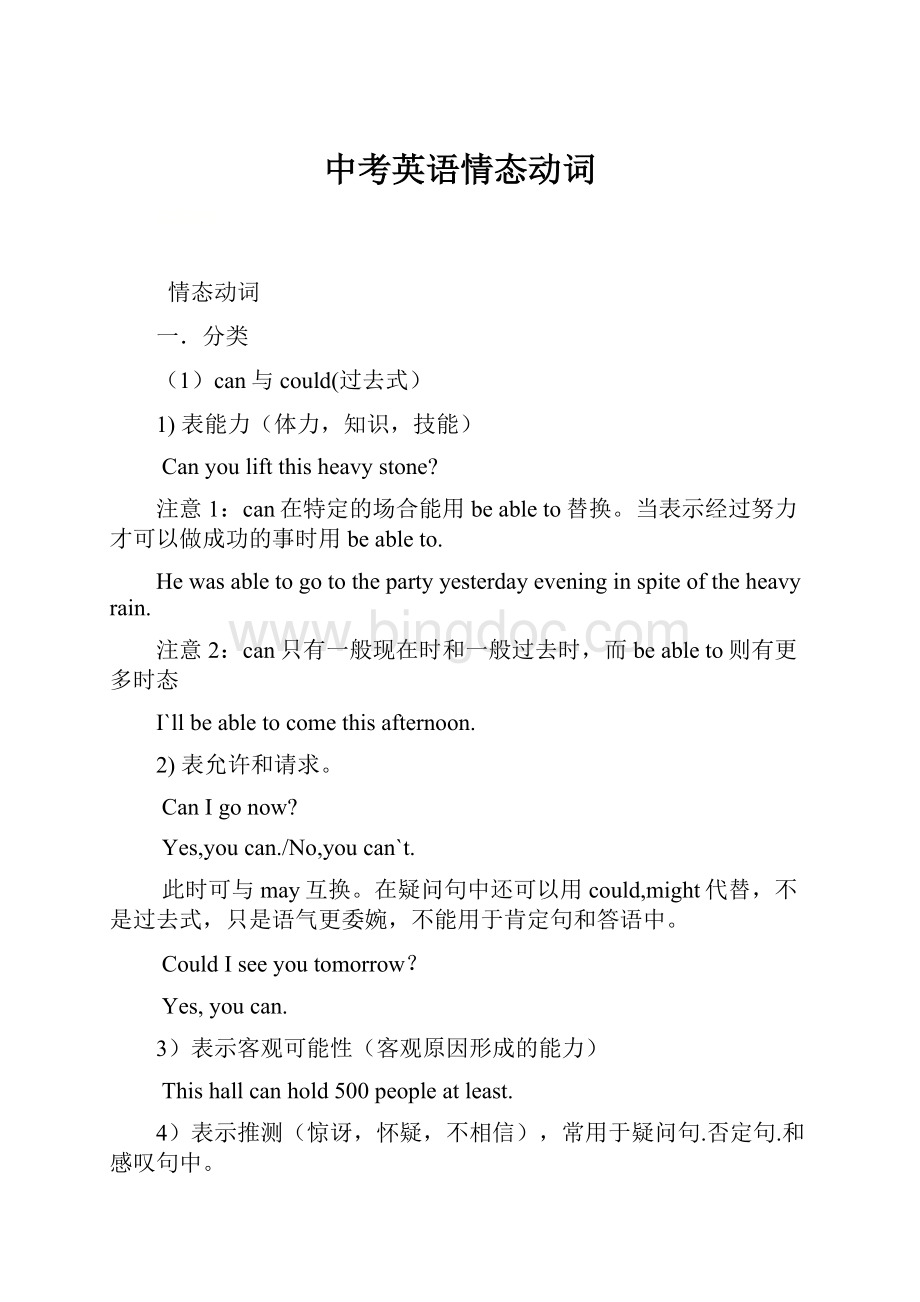中考英语情态动词.docx
《中考英语情态动词.docx》由会员分享,可在线阅读,更多相关《中考英语情态动词.docx(13页珍藏版)》请在冰点文库上搜索。

中考英语情态动词
情态动词
一.分类
(1)can与could(过去式)
1)表能力(体力,知识,技能)
Canyouliftthisheavystone?
注意1:
can在特定的场合能用beableto替换。
当表示经过努力才可以做成功的事时用beableto.
Hewasabletogotothepartyyesterdayeveninginspiteoftheheavyrain.
注意2:
can只有一般现在时和一般过去时,而beableto则有更多时态
I`llbeabletocomethisafternoon.
2)表允许和请求。
CanIgonow?
Yes,youcan./No,youcan`t.
此时可与may互换。
在疑问句中还可以用could,might代替,不是过去式,只是语气更委婉,不能用于肯定句和答语中。
CouldIseeyoutomorrow?
Yes,youcan.
3)表示客观可能性(客观原因形成的能力)
Thishallcanhold500peopleatleast.
4)表示推测(惊讶,怀疑,不相信),常用于疑问句.否定句.和感叹句中。
Canthisbetrue?
Thiscanbedonebyhim.
Howcanthisbetrue?
(2)may与might
1)表示请求和允许。
might比may的语气更委婉,而不是过去式。
否定回答时可用can`t或者musn`t,表示不可以或禁止。
Might/MayIsmokehere?
No,youmusn`t.
Might/MayItakethisbookoutofthisroom?
Yes,youcan.(No,youcan`t/musn`t)
注意:
用MayI....?
征求别人许可时比较正式和客气,而CanI...?
更多用于口语。
2)用于祈使句,表示祝愿。
Mayyousucceed!
3)表示推测.可能性(不用于疑问句)
Might不是过去式,他所表示的可能性比may小。
Hemay/mightbeverybusynow.
Yourbrothermay/mightnotknowthetruth.
(3)must,haveto
1)表示必须.必要。
Youmustcomeintime.
在回答引出的问句时,如果是否定的,不能用musn`t不准,而用needn`t/don`thaveto不必
Mustwehandinourhomeworktoday?
Yes,youmust.
No,youdon`thaveto/youneedn`t.
2)must说话表主观看法,而haveto强调客观需要。
must只有一般现在时,haveto则有更多的时态。
Thefilmisn`tinteresting.Imustgonow.
IhadtoworkhardwhenIwasyourage.
3)表推测可能性(只用于肯定的陈述句)
Youaremybestfriend,soyoumustknowwhatIlikebest.
Yourmothermustbewaitingforyounow.
(4)dare与need
1)dare作情态动词时,常用于疑问句,否定句和条件从句中,过去形式为dared(实义动词才有).
HowdareyousayI`munfair?
Hedaren`tspeakEnglishinfrontofpeople,darehe?
Ifwedarednotgotherethatday,wecouldn`tgetthebeautifulflowers.
2)need作情态动词时常用于疑问句.否定句。
在肯定句中一般用must,haveto,oughtto,should代替。
Youneedn`tcomesoearly.
NeedIfinishtheworktoday?
Yes,youmust./No,youneedn`t.
3)dare和need作实义动词的时候,有人称,时态和数的变化。
在肯定句中,dare后面常接带to的不定式,在否定句和疑问句中,dare后面可接带to或者不带to的不定式。
而need后面只能接带to的不定式。
Idaretoswimacrossthisriver.
Hedoesn`tdare(to)answer.
Heneedstofinishhishomework.
(5)shall,should
1)shall用于第一人称,征求对方意见。
Whatshallwethisevening?
2)shall用于二三人称,表示说话人给对方的命令.警告.允诺或者威胁。
Youshallfailifyoudon`tworkhard.(警告)
HeshallhavethebookwhenIfinishit.(允诺)
Heshallbepunished.(威胁)
(6)will与would
1)表示请求建议等,would更委婉。
Will/Wouldyoupassmetheball,please?
2)表示意志,愿望和决心
Iwillneverdothatagain.
Theyaskedhimifhewouldgoabroad.
3)Would表示过去反复发生的动作或某种倾向。
would表示过去习惯时比usedto正式,且没有“现已无此习惯”的含义。
Duringthevacation,hewouldvisitmeeveryday.
Thewoundwouldnotheal.
4)表示估计和猜想
Itwouldbeaboutteno`clock.
(七)should与oughtto
1)should/oughtto表示应该,oughtto表示义务和责任,比should语气重。
Ishouldhelpherbecausesheisintrouble.
Yououghttotakecareofthebaby.
2)表示劝告,建议,和命令。
Should/oughtto可通用,但在疑问句中常用should.
Youshould/oughttogotoschoolrightaway.
ShouldIopenthewindow?
3)表示推测。
Should/oughtto客观,must主观。
Hemustbehomebynow.
Heoughtto/shouldbehomebynow.
(八)特殊结构:
情态动词+不定式完成式(havedone)
1)can/could+havedone在肯定句中,表示“本来可以做而实际上未做’,是虚拟语气;在疑问句中或者否定句中表示对过去行为的怀疑或不肯定,表示推测。
Youcouldhavedonebetter,butyoudidn`ttryyourbest.(虚拟)
Hecan`thavebeentothattown.(推测)
Canhehavegotthebook?
(推测)
2)may/might+havedone表示对过去行为的推测,没有虚拟语气。
might的可能性可能比may小。
Hemaynothavefinishedthework.
Ifwehadtakentheotherroad,wemighthavearrivedearlier.
3)must+havedone表示“一定,想必”。
其疑问句,否定形式用can,can`t代替。
Youmusthaveseenthefilm.
HemusthavebeentoShanghai.
4)should+havedone用于肯定句中,表示对过去行为的推测。
Heshouldhavefinishedtheworkbynow.
表示“本该做而实际没做”,其否定式表示“本不该发生却发生了”。
可以与oughtto+不定式完成式互换。
Yououghtto/shouldhavehelpedhim.(实际没有)
Youshouldn`thavetakenawaymytape.(实际带走了)
5)needn`t加不定式完成式(havedone)
本来不必而实际做了
Youneedn`thavewateredtheflowers,foritisgingtorain.
6)will+不定式完成式(havedone)
主要用于二三人称,表示对已完成动作或事态的推测。
Hewillhavearrivedbynow.
二.情态动词用法总结:
(1).情态动词表推测三种句式。
1.在肯定句中一般用must(一定),can/could(可能),might/may也许。
2.在否定句中用can`t/couldn`t(不可能),maynot/mightnot(可能不)。
3.在疑问句中用can/could...
(二).情态动词表推测三种时态。
1.对现在情况的推测用“情态动词+动词原形”。
Shemust/may/might/couldarrivebefore5.
2.对现在或一般情况的推测用“情态动词+be”或“情态动词+bedoing”或者“情态动词+动词原形”。
Hemust/may/might/couldbelisteningtotheradionow.
Hecan`t(couldn`t)/may(might)notbeathomeatthistime.
3.对过去情况的推测用“情态动词+have+过去分词”。
Itmust/may/might/couldhaverainedlastnight.Thegroundiswet.
Thedoorwaslocked.Hecan(could)not/may(might)nothavebeenathome.
注意:
情态动词should/oughtto与have+过去分词连用,又会构成虚拟语气,意为“本应该做却没做”。
It`sseveno`clock,Jackshould/oughttobehereatanymoment.(推测)
Tomshouldnot/oughtnottohavetoldmeyoursecret,buthemeanttonoharm.(虚拟).
3.练习
1.—Dad,mustwewaituntilthelightbecomesgreen?
—Yes,I'mafraidwe______.That'sthetrafficrule.
A.canB.mayC.havetoD.need
2.._IseeyourIDcard,sir?
Wehavetocheckyourinformation.
A.MayB.MustC.ShouldD.Need
3.Finishyourhomeworkfirst,thenyou’ll_______watchTVforanhour.
A.canB.beabletoC.ableDcould
4.—Amy,Ihearyou’vegotmanyforeigncoins.______Ihavealook?
—Ofcourse,I’llfetchthemforyou.
A.MayB.MustC.ShouldD.Need
5.—Whereareyougoingthismonth?
—We______gotoXiamen,butwe'renotsure.
A.needn’tB.mustC.mightD.mustn't
6.—MayIgooutforawhile,Mom?
—No,you.Youhavetofinishyourhomeworkfirst.
A.shouldn'tB.needn'tC.mustn'tD.won't
7.Studentsinourschool________knowshoutingisnotallowedinthelibrary.
A.canB.mayC.mustD.need
8.—_______Ihavelunchnow,Mom?
—No.Youmustwashyourhandsfirst.
A.WouldB.MayC.Oughtto
9.—Haveyoudecidedwheretogoforyoursummervacation?
—Notyet.We_______gotoQingdao.It'sagoodplaceforvacation.
A.mayB.needC.must
10.—CanIborrowyourruler,please?
—Yes,you.Butyoumustreturnittomebeforelunchtime.
A.haveB.canC.mustD.usedto
11.—CanIparkmycarinfrontofthebuilding?
—No,you________.
A.won'tB.can'tC.needn'tD.couldn't
12.—ShallItakemyswimmingsuit?
—No,you.Wewilljustgohikinginthemountain.
A.mustn’tB.couldn’tC.needn’tD.can’t
13.Drivers________wearseatbeltswhiletheircarsarerunningontheroad.
A.needB.canC.mustD.may
14.―MustIreturnthebookthisweek?
―No,you.Youcanitfor20days.
A.mustn’t,keepB.needn’t,borrowC.needn’t,keep
15.—Excuseme,whosebookisthis?
—It________beJohn’s.Ithashisnameonit.
A.mustB.needC.can’t
16.—____Iswimhere?
—No,you_____.Lookatthesign“Noswimming”.
A.Must:
can’tB.Can;don’tC.Can;mustn’t
17.—MustIgotomedicalschoolandbeadoctorlikeyou,dad?
—No,you_______,son.You’refreetomakeyourowndecision.
A.can’tB.mustn’tC.shouldn’tD.needn’t
18.Alotofforeigners______familiarwiththefamousplacesifinterestinChina.
A.amB.isC.areD.be
19.Theman______bemyEnglishteacher.HehasgonetoCanada.
A.mightB.mustC.can’t
20.Acountryhasdreams.Weteenagers________alsohavedreams.Withdreamsandhardwork,anythingamazingcanbecreated.
A.mayB.mustC.should
21.Accordingtothenewtrafficlaw,everyoneinacar_______weartheseatbelt.
A.canB.mayC.mustD.will
22.There'sonlyonedaytogo.You_____finishyourschoolworkbytomorrow.
A.canB.willC.mustD.may
23.—Who’sthemanoverthere?
IsitMr.Black?
—It______behim.He’smuchtaller.
A.maynotB.can’tC.willnotD.mustn’t
24.Youmustn’tgooffonyourown,becauseyou_______getlostinthemountains.
A.shouldB.mustC.needD.might
25.—Areyouinaburry?
—NO,I’vegotplentyoftimeIwait.
A.canB.can’tC.mustD.mustn’t
26.______abeautifulcar!
I’veneverseenitbefore.
A.WhatB.WhichC.HowD.Whether
27.Ifyou______go,atleastwaituntiltherainstops.
A.canB.mayC.mustD.will
28.—_________Ihelpyou,sir?
—Yes.IwantaT-shirt.
A.CanB.ShouldC.MustD.Would
29.-Oh,it'sraininghard.
-Becareful!
Theroadbewet.
A.couldB.mustC.might
30.You____________driveyourcarsofast.It’sverydangerous.
A.wouldn’tB.shouldn’tC.couldn’tD.mightn’t
31.—Hello,Lisa.What'sthematter?
—I______findmymobilephone._______youseenit?
A.couldn't;DidB.can't;HaveC.need;HadD.must;Are
32.—WhoseT-shirtisthis?
—It________beJohn’s.It’s________smallforhim.
A.can’t;muchtooB.can’t;toomuchC.mustn’t;toomuch
33.-MustIreturnbeforedinner,Mum?
-No,you.Youcancomebacklater.
A.mustn’tB.needn’tC.maynot
34.ThewomanwhoistalkingwithMr.Brown______beMissLi.ShehasgonetoEngland.
A.can’tB.mustC.mayD.mustn’t
35.FromMarch23rd2013,anyoneundertheageof14________gointoDisney'sUSparksalone.
A.couldn'tB.mustn'tC.needn'tD.mightn't
36.—LiLei,hurryup!
Thebusiscoming.
—Oh,no.We______crossthestreetuntilthetrafficlightsturngreen.
A.mustn’tB.maynotC.needn’tD.haveto
37.You____________driveyourcarsofast.It’sverydangerous.
A.wouldn’tB.shouldn’tC.couldn’tD.mightn’t
38.—MayIsmokehere?
—No,you_______.Thisisano-smokingroom.
A.needn’tB.mustn’tC.couldn’tD.wouldn’t
39.Excuseme,sir.You______openthedoorbeforethetrainstops.
A.mustn'tB.needn’tC.maynotD.don’thaveto
40.—Honey,stayhomebeforeIreturn.
—I________,mum.
A.mustB.canC.willD.should
41.—Lookattheboyplayingbasketballontheground.IsitGeorge?
—It______behim.Hetoldmehewouldplaybasketballafterclass,buthe’snotsure.
A.mustn’tB.mustC